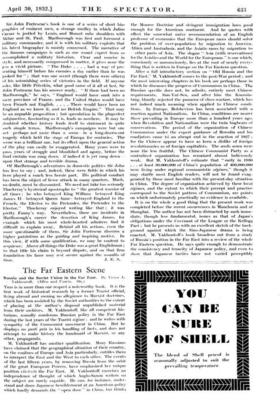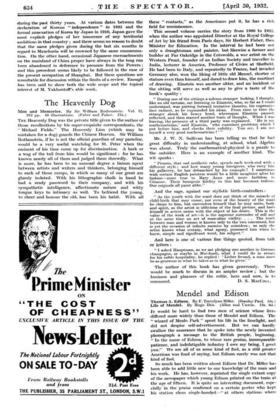The Fat Eastern Scene
'Russia and the Soviet Union' In the Far East. By Vim-tor A.
• Yakhooton., - (Allen and rnwin. 1St.)
Tina is in more than one respect a noteworthy book. It is the lirst Work of historical research by a Milner Tsarist official, living abroad and owning no allegiance to Marxist doctrines. which has been assisted; by the Soviet authorities to t heextett
of placing at the author's disposal unpublished material from their arehives. M. Yakhontoff, like all competent his- torians, roundly condemns Russian policy in the .Far East storing the last years of the Tsarist regime ; and he writes with sympathy of the Communist movement in China. But he displays no Mali pris in his handling of facts. and does not attempt to make history the handmaid_ of Marxist, or any other, propaganda.
M. Yakhontoff has another qualification. Many Russians • have claimed that the geographical situation of their country, on the confines of Europe and Asia particularly, entitles them
to interpret the East and the West to each other. The events of the last -fifteen years, by removing Russia from the orbit
of the great European Powers, have emphasized her unique
position ris-a-ris the Far East. M. Yakhontoff exercises an independence of thought of which Anglo-Saxon writers on the subject are rarely capable. De call, for instance, muter- stand and share Japanese bewilderment at an American policy wine)) loudly demands the " npen door " in China, but thinks
the Monroe Doctrine and stringent in iiii igmtion laws good enough for the American continent. And he quotes with effect the somewhat naive reco llllllllllllllll of an English pmfessor of economics that the European races should solve the problem of over-population by migration to America. Africa and Australasia, and the Asiatic races by migration to other parts of Asia. The slogan " Asia (with reservations) for the Asiatics and the World for the Europeans " is one which, consciously or unconsciously, lies at the root of nearly every- thing that is written in Europe on the Far Eastern question.
After a full introductory Sections 011 " Old Russia and tho Far East," M. Yakhontoff comes to the post-War period ; and the most interesting chapters in his book are perhaps those in which he discusses the progress of Co llllll unisni in China. The Russian specific does not, lie admits, entirely !met Chinese requirements. Sun-Vat-Semi, and after him the Kuomin- tang, bluntly rejected the panacea of class-warfare, which has not indeed much meaning when applied to Chinese condi- tions. In Europe, Bolshevism has been associated with a reaction against Nationalism. In China, conditions are nearer those prevailing in Europe mane than a hundred years ago. when Revolution and Nationalism were the twin bugbears of conservatism. The period sir the organization of Chinese Communism under the expert guidance of Borodin and his
Mine td 1111 abrupt end in the reaction of 19'17; Mr the Chinese appear to have as keen a dislike of foreign revolutionaries as of foreign capitalists. The seeds sown were none the less fruitful. The Chinese Communist Party as it centralized organization has remained almost ludicrously weak. But M. Yakhontoff's estimate that "early in 1118(1
at least 30.1X10,000 of China'.s popular of 400,000,000 were living under regional communistic regimes," though it may startle most English' renders, will not be found exag- gerated by those most familiar with the present-day situation in China. The degree of organization achieYed by these Meal regimes, and the extent to which their precept and practice correspond to the Soviet pattern of Communism, arc points on which unfortunately practically no evidence is available. - It is on the Will/le a good thing that the present work was completed before the recent occurrences in Manchuria and at Shanghai. The author has not been distracted by such iulme- diate, though less fundamental, issues as that of Japan's obligations under the tnvenant of the League or the Kellogg Pact ; but he presents us with an excellent sketch of the back- ground against which time Sino-Japanese drama is king enacted. M. Yakhontoff's book broadens out front a study of Russia's position in the Far East into a review of the whole Far Eastern question. Ile says quite enough to demonstrab: the consistency and tenacity of Japanese policy, and even to show that Japanese tactics luxe 04 varied pereeptibly during the past thirty years. At various dates between the declaration of Korean " independence " in 1895 and the formal annexation of Korea by Japan in 1910, Japan gave the most explicit pledges of her innocence of any territorial ambitions in that country ; and there seems no reason to doubt that the same pledges given during the last six months in regard to Manchuria will be crowned by the same consumma- tion. On the other hand, occasional Japanese encroachments on the mainland of China proper have always in the long run been abandoned in deference to pressure from the Powers ; and this precedent seems likely to be followed in the case of the present occupation of Shanghai. But these questions are unsuitable for discussion within the limits of a review. Enough has been said to show both the wide scope and the topical interest of M. Yakliontoff s able work.







































 Previous page
Previous page